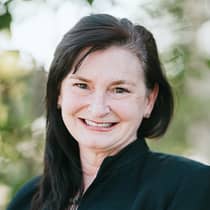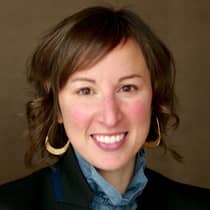Get matched with the exact support you need
Explore our eating disorder treatment programs for adults, teens and children below. See how our continuum of care starts with a free clinical assessment and extends all the way through to aftercare support. As you scroll through the page, you'll learn how to get started with care in three easy steps.

Real People. Real Stories. Real Progress.
Our expert care teams ensure people of all ages, races and gender identities get the exact support they need at each stage of their recovery. With the right care, lasting healing is possible – and we have the data to show it.
73% of patients no longer reported significant eating disorder symptoms

Inpatient eating disorder treatment
ERC’s inpatient program provides care and ongoing medical supervision for adults, teens and children who have severe eating disorders or are at risk for medical complications related to eating disorders. Our medical and behavioral health experts provide intensive treatment with nursing supervision, full-time primary care and psychiatric physician support, and nutrition and psychotherapy services. Treatment takes place 24 hours a day, seven days a week. Conveniently located near major medical campuses, ERC can provide a seamless transition to acute care if an emergency arises.

Residential eating disorder treatment
In ERC’s residential program, individuals with fewer severe medical complications receive support 24 hours a day, seven days a week in a highly structured environment that includes full-time primary care and psychiatry physician support. Benefit from state-of-the-art medical and behavioral care as you interrupt eating disorder thoughts and behaviors and find the healing you deserve.

Eating disorder partial hospitalization program
Get the right support at the right time in ERC’s unique seven-day-per-week, six- to 11-hour-per-day eating disorder partial hospitalization program (PHP). Many PHPs offer care only five days per week. But weekends away from treatment can cause unnecessary relapses and regressions. That’s why our PHP provides full-day treatment seven days a week -- the maximum clinical standard of care -- because we understand that eating disorders don’t take the weekend off.

Eating disorder intensive outpatient program
Our flexible three- to four-day-per-week, three- to five-hour-per-day intensive outpatient program (IOP) offers you the chance to live at home, go to work or school, care for children and be fully involved in your life -- all while attending treatment. In IOP, come as you are so you can be heard, understood and healed.

Virtual eating disorder intensive outpatient program
As effective as our in-person treatment options, Eating Recovery At Home provides a virtual three-day-per-week, three- to four-hour-per-day IOP for eating disorders. Recognized by top publications as the Best Online Therapy Service in 2022, 2023 and 2024, and covered by most major insurers, discover virtual IOP and take recovery home today.

Eating disorder treatment for children and adolescents
Here at ERC, you’ll find effective, compassionate eating disorder treatment for individuals ages 8-17. Our treatment approach for this age group is rooted in family-based treatment (FBT) and emotion-focused family therapy (EFFT). As your loved one moves along the path of recovery, we will be offering you, the caregiver, a variety of educational and support programs to help you learn how to best support your loved one at home.

Eating disorder treatment for adults
Providing care for adults of all ages, our experienced physicians, therapists and registered dietitians are here to help you recover from eating disorders and any co-occurring mental health concerns such as anxiety, depression, trauma and obsessive-compulsive disorder. As you navigate the recovery journey, we’ll help you create a rich and meaningful life based on your personal values.

Ongoing family support for eating disorders
We believe that every person has the ability to build resiliency and find eating disorder recovery. When your loved one enters treatment at ERC, we will be by your side every step of the way. Each week, we will equip you with the resources you need to better understand eating disorders and how to support your loved one. Thank you for trusting us as we navigate this journey together.

Alumni and aftercare support
Our community outreach liaisons will keep you connected and supported, providing you and your family with tools you need before, during and after treatment. Eating disorder recovery resources for alumni include:
Three Steps to Find Healing
1
Come as you are.
2
Get the right support at the right time.
3
Stay connected to your recovery community.
Step 1: Come as you are.
The first step toward recovering from an eating disorder can be the most difficult. That’s why we invite you to come as you are today. When you come as you are, we’ll get to know you as a whole person, your personal strengths and challenges, where you are in your journey and how we can help you move toward what’s important to you.
This personalized approach begins with our very first interaction. We’ll connect you with an experienced mental health professional who will get to know you as a whole person and help you explore your options. Assessments are free and 100% confidential. There is no obligation and you never need a referral.
Your assessment will help us determine what support you need to ensure you get the right care at the right time.
We are the golden thread through all levels of care, providing you with collaborative, integrated and comprehensive care.

Chief Medical Officer and Chief Clinical Officer, Eating Recovery Center
Step 2: Get the right support at the right time.
The path to lasting recovery doesn’t always follow a straight line. It’s common for people to move through various levels of care as they find healing.
Our continuum of care ensures that your transitions between levels of care will be as smooth as possible. Our team will be by your side — and setting you up for success.
When you come to us, you’ll work with the same specialized care team from the beginning. That means you’ll stay with the same physician, psychiatrist, therapist and dietitian when possible, no matter what level of care you need.
Being able to tell your story once and then live out the rest of your journey with the same care team and approach allows you to experience the full season of what you need and reduces the risk of relapse.
Benefits to this approach
The continuum of care greatly reduces the risk of relapse or regression during treatment. It also eliminates the stress that people sometimes feel when they have to tell their story over and over to different providers. And it clears your path to healing, with education along the way so you know what to expect at each level of care prior to any transitions.
Eating disorder therapy
During treatment, our providers will use leading therapeutic interventions based on the latest clinical evidence. These therapies are designed to address your symptoms and help you understand the underlying reasons they occur. Our therapeutic approaches include:
- Acceptance and commitment therapy (ACT), which identifies your motivation to seek help and barriers that stand in your way
- Cognitive behavioral therapy (CBT), which identifies and corrects negative thoughts and triggers
- Dialectical behavior therapy (DBT), which builds emotion regulation and resilience while teaching practical skills
Here, you always belong
Our teams are deeply committed to creating a safe, supportive and affirming environment for all people who seek our care. This includes compassionate professional training that ensures our clinicians and staff will honor and support our patients wherever they are on their personal journey.
We practice weight-inclusive care and gender-affirming care, with a variety of resources for LGBTQIA+ patients and people in the BIPOC community.
Step 3: Stay connected to your recovery community—both during and after treatment.
Our community outreach team will keep you connected and supported. They’ll connect you and your family with tools you need before, during and after your treatment.
Our care team will also help you make a smooth transition back to your outpatient providers. We’ll keep them in the loop throughout your treatment journey and give them the tools they need to further your recovery after you leave ERC.
The continuum of care offers a gradual process of healing, helping you gain independence and prove to yourself that you can do it, while still having the net there to catch you should you need it.
Eating Recovery Center alum
Come as you are today.
Hide Last Child Layout Div



